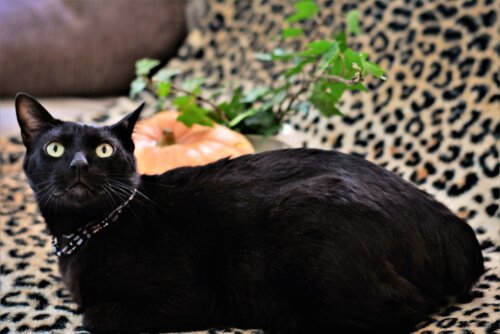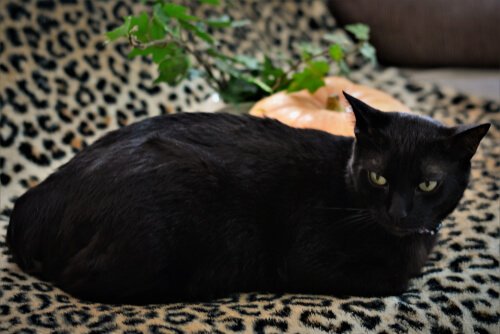Japanese Bobtail: Caring for Them and Their Behavior


Written and verified by the lawyer Francisco María García
The Japanese Bobtail is a very old Asian cat breed with a fairly mysterious origin. These felines are stand out for their very short tails, and they also have an extremely sociable and affectionate personality.
Although they first inhabited the Japanese islands more than 1,000 years ago, this breed only gained international popularity in the last decades of the twentieth century. Below, you can learn a little more about the Japanese Bobtail’s behavior, health and basic care.
Physical traits
Japanese Bobtails are medium-sized cats that can weigh between 2.5 and 4 kilos. Their bodies are thin and slender, but they have well-developed muscles.
They have long, strong legs that allow them to have dexterity and a lot of flexibility when running and jumping. However, their most striking feature, without a doubt, is their short tail.
Their head has an equilateral triangle shape and its size is proportional to the rest of the body. They have large, wide and oval-shaped eyes with colors that harmonize with the cat’s fur. This breed has ears that are rounded at the tips and are almost always pointing up.
Their coat can be short or long, but its texture is always silky and soft to the touch. Also, long-haired Japanese Bobtails that have wavy coats at the tips.

These cats can be a variety of solid colors, except for Siamese, lilac, chocolate, and Abyssinian. There are also two-color males that are black and white and three-colored females that are white, black and red.
The Japanese Bobtail’s behavior
Japanese Bobtails stand out because of their affectionate, intelligent, sociable and playful personality. They are much more extroverted than the vast majority of cat breeds.
Although they enjoy their moments of serenity, these kittens are almost always ready to play, learn and be pet by their family. So, their popularity as a pet as has grown enormously around the world.
These cats don’t like to be alone or enclosed for long periods of time. That’s why they adapt better to homes or apartments that have access outside (gardens, terraces, etc.).
Due to their intelligence and sensitivity, they need daily physical and mental stimulation to maintain their good health and balanced behavior. If they don’t live in an enriching environment, they can very easily develop stress symptoms.
Another interesting thing is that these cats are usually very expressive and can communicate a wide range of sounds to their owners. In fact, this breed is known for their “singing voice” that enable them to intonate different melodies in their daily routines.

Essential care
The Japanese Bobtail requires regular brushing to keep its coat looking beautiful and to prevent hairballs in their digestive system. You should groom short-haired cats at least three times a week.
If your kitten is long-haired, they’ll need daily brushing to keep their fur looking its best. The benefits of this daily task will be seen in his freshly combed outer appearance.
A complete and balanced diet is key for your cat’s full development, physically, cognitively, emotionally and socially. It’s always best to ask your vet about the best diet for the Japanese Bobtail.
Since they’re very active and intelligent, these cats need to live in an enriched environment that stimulates their curiosity. They need to be able to exercise both their body and their mind. Also, their owner’s company is very important to help the Japanese Bobtail enjoy a happy and healthy life.
The Japanese Bobtail cat’s health
The Japanese Bobtail cat’s estimated life expectancy is 9 to 15 years. However, their actual longevity will depend on the care and environment that their owner gives them. Cats that live in a happy home and receive the right care can live longer.
Like all feline breeds, the Japanese Bobtail shows a genetic disposition to certain diseases. Below, is a list of the most frequent pathologies in the Japanese Bobtail cat:
- Hairballs in the gastrointestinal tract (trichobezoars).
- Urinary and kidney problems
- Obesity (when subjected to a sedentary lifestyle)
Also, remember that all cats, whether mixed breed or purebred, need to have proper preventative medicine throughout their lives.
Remember to take your Japanese bobtail to the veterinarian every six months, to be current on their vaccination dates, and to do periodical internal and external deworming.
The Japanese Bobtail is a very old Asian cat breed with a fairly mysterious origin. These felines are stand out for their very short tails, and they also have an extremely sociable and affectionate personality.
Although they first inhabited the Japanese islands more than 1,000 years ago, this breed only gained international popularity in the last decades of the twentieth century. Below, you can learn a little more about the Japanese Bobtail’s behavior, health and basic care.
Physical traits
Japanese Bobtails are medium-sized cats that can weigh between 2.5 and 4 kilos. Their bodies are thin and slender, but they have well-developed muscles.
They have long, strong legs that allow them to have dexterity and a lot of flexibility when running and jumping. However, their most striking feature, without a doubt, is their short tail.
Their head has an equilateral triangle shape and its size is proportional to the rest of the body. They have large, wide and oval-shaped eyes with colors that harmonize with the cat’s fur. This breed has ears that are rounded at the tips and are almost always pointing up.
Their coat can be short or long, but its texture is always silky and soft to the touch. Also, long-haired Japanese Bobtails that have wavy coats at the tips.

These cats can be a variety of solid colors, except for Siamese, lilac, chocolate, and Abyssinian. There are also two-color males that are black and white and three-colored females that are white, black and red.
The Japanese Bobtail’s behavior
Japanese Bobtails stand out because of their affectionate, intelligent, sociable and playful personality. They are much more extroverted than the vast majority of cat breeds.
Although they enjoy their moments of serenity, these kittens are almost always ready to play, learn and be pet by their family. So, their popularity as a pet as has grown enormously around the world.
These cats don’t like to be alone or enclosed for long periods of time. That’s why they adapt better to homes or apartments that have access outside (gardens, terraces, etc.).
Due to their intelligence and sensitivity, they need daily physical and mental stimulation to maintain their good health and balanced behavior. If they don’t live in an enriching environment, they can very easily develop stress symptoms.
Another interesting thing is that these cats are usually very expressive and can communicate a wide range of sounds to their owners. In fact, this breed is known for their “singing voice” that enable them to intonate different melodies in their daily routines.

Essential care
The Japanese Bobtail requires regular brushing to keep its coat looking beautiful and to prevent hairballs in their digestive system. You should groom short-haired cats at least three times a week.
If your kitten is long-haired, they’ll need daily brushing to keep their fur looking its best. The benefits of this daily task will be seen in his freshly combed outer appearance.
A complete and balanced diet is key for your cat’s full development, physically, cognitively, emotionally and socially. It’s always best to ask your vet about the best diet for the Japanese Bobtail.
Since they’re very active and intelligent, these cats need to live in an enriched environment that stimulates their curiosity. They need to be able to exercise both their body and their mind. Also, their owner’s company is very important to help the Japanese Bobtail enjoy a happy and healthy life.
The Japanese Bobtail cat’s health
The Japanese Bobtail cat’s estimated life expectancy is 9 to 15 years. However, their actual longevity will depend on the care and environment that their owner gives them. Cats that live in a happy home and receive the right care can live longer.
Like all feline breeds, the Japanese Bobtail shows a genetic disposition to certain diseases. Below, is a list of the most frequent pathologies in the Japanese Bobtail cat:
- Hairballs in the gastrointestinal tract (trichobezoars).
- Urinary and kidney problems
- Obesity (when subjected to a sedentary lifestyle)
Also, remember that all cats, whether mixed breed or purebred, need to have proper preventative medicine throughout their lives.
Remember to take your Japanese bobtail to the veterinarian every six months, to be current on their vaccination dates, and to do periodical internal and external deworming.
This text is provided for informational purposes only and does not replace consultation with a professional. If in doubt, consult your specialist.








